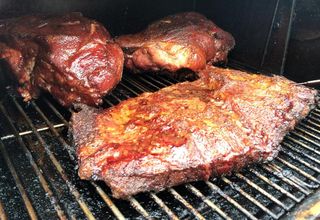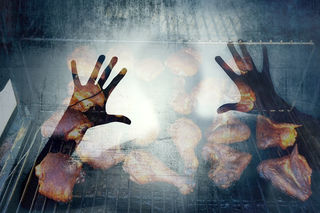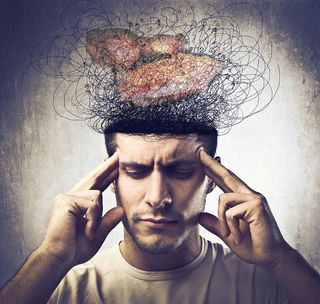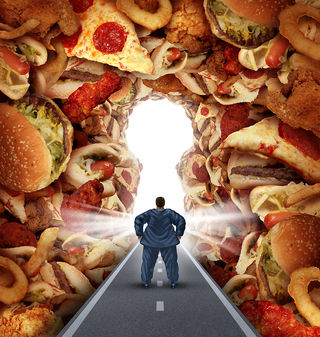Fantasies
Moderation - Strategy or Fantasy?
Another useless relative at the table
Posted July 6, 2016

If Moses had seen me eat barbecue there would be another commandment. Worse yet,for health reasons, my eating barbecue is like emailing terrorist threats to the National Security Agency – not a good idea. So July 4th gave me fits because Memorial Day, July 4th, and Labor Day are all about eating barbecue to me. On occasion I have tried to avoid eating barbecue on these holidays and the decision has resulted in my becoming severely depressed and bingeing because barbecue is my ultimate comfort food.
"Comfort foods can actually help alleviate some depressive symptoms. But unfortunately, too much unhealthy food may lead to higher levels of depression. On the other hand, complete denial of comfort foods can increase your desire for them, and doesn't allow you to take advantage of their emotional soothing. So how can you get the best of both worlds? Moderation," says Dr. Alex Korb, UCLA neuroscientist, and author of the best-selling book on depression – “The Upward Spiral.”

Moderation? Seriously? If moderation were an option I wouldn’t be on Tony Roma’s Christmas list. I am a food addict – and barbecue is my favorite fix. I need a strategy, not a fantasy, and moderation is a fantasy – at best.
In compulsive behaviors, the human brain cannot conceptualize moderation, so it is incapable of employing it.[1] Behavioral studies have shown that the more specific and defined a goal is the more achievable it is.[2-8] Moderation is very unspecific and determined by what one’s brain considers as normal, i.e., common, or frequent.[1, 9, 10] Normal in the Dr. Gordon brain and the Dr. Korb brain are very different. Moderation for me is 3 slabs of ribs, and 2 chickens, opposed to 6 slabs of ribs and a half a dozen chickens. While that might be making progress, it is not decreasing the chances of my life becoming a cautionary tale about unmanaged food addiction.
In managing a food addiction you have to exert a high-definition-camera and small-childlike honesty - brutal frightening truths. That said, why is eating barbecue so important to me? It is not about an enjoyable eating experience because research shows, food addicts such as I, do not enjoy food as much as normal eaters do.[11-17]
True, processed foods (sugars in particular) fuel the fire but there are deeper issues.

Symbolic interaction with food is a larger part of the problem. When humans symbolically interact, it is not the symbols that are important, but what they represent. Words, like fire, love, sex, hate, are just graphic configurations, and not important in and of themselves, but what we agree those symbols represent is very important. [18-24]
For me, eating barbecue on those summer holidays during my childhood symbolizes happy times - being in parades, at family gatherings, alone time with my father as he grilled. (He worked nights and slept during the days, so dad/son alone time was precious). There you have it! Eating barbecue symbolizes getting attention and social approval (being in parades) connectivity, gender-parent bonding (happy family gatherings – alone time with my dad). Those are vital human needs that become greater and harder to satisfy as time passes. Commensurately, the dependence on the symbolic interaction with the comfort food grows.
So what do I do? Similar to the logic of some girls who claim the best way to get over a guy is to get underneath a new guy, you have to replace a bad habit with a healthier, more fully satisfying habit. The harsh reality is symbolic interaction with comfort foods do not fix the problem, any more than having an arm-candy boyfriend or girlfriend that treats you like foot fungus satisfies the need to be loved. The issue here is not eating barbecue, the issue is the inability to manage the emotions feelings of loneliness, lack of appreciation and social despair generate – and that’s ugly, which is not news. The truth is never pretty, but it is always beautiful because pretty is a thing and beauty is a force. The beauty here is that feelings are not facts – they are perceptions. Even if your reality is harsh, how you frame it is more important – a ruby is a jewel, but it is also stone. It can be the rapture of solitude or the agony of being alone – you choose.

So finding replacements that completely satisfy the needs your symbolic interaction with comfort foods only partially satisfied is how you achieve moderation because you can never get enough of something that’s almost satisfying. Remain fabulous and phenomenal!
Join my email list to receive notifications of new posts
or visit me at:
UCLA Center for the Neurobiology of Stress
References
1. Ungar, M., M. Ghazinour, and J. Richter, Annual Research Review: What is resilience within the social ecology of human development? J Child Psychol Psychiatry, 2013. 54(4): p. 348-66.
2. Akubuiro, A., et al., Hyperactive hypothalamus, motivated and non-distractible chronic overeating in ADAR2 transgenic mice. Genes Brain Behav, 2013. 12(3): p. 311-22.
3. Bonini, L., et al., Grasping neurons of monkey parietal and premotor cortices encode action goals at distinct levels of abstraction during complex action sequences. J Neurosci, 2011. 31(15): p. 5876-86.
4. Davidson, R.J. and W. Irwin, The functional neuroanatomy of emotion and affective style. Trends Cogn Sci, 1999. 3(1): p. 11-21.
5. de Wit, S. and A. Dickinson, Associative theories of goal-directed behaviour: a case for animal-human translational models. Psychol Res, 2009. 73(4): p. 463-76.
6. Dezfouli, A. and B.W. Balleine, Actions, action sequences and habits: evidence that goal-directed and habitual action control are hierarchically organized. PLoS Comput Biol, 2013. 9(12): p. e1003364.
7. Epstein, H.T., The molecular biology of brain and mind development. Bioessays, 1989. 10(2-3): p. 44-8.
8. Gerson, S.A. and A.L. Woodward, The goal trumps the means: Highlighting goals is more beneficial than highlighting means in means-end training. Infancy, 2013. 18(2): p. 289-302.
9. Sheikh, H.I., et al., Links between white matter microstructure and cortisol reactivity to stress in early childhood: evidence for moderation by parenting. Neuroimage Clin, 2014. 6: p. 77-85.
10. Tannenbaum, B. and H. Anisman, Impact of chronic intermittent challenges in stressor-susceptible and resilient strains of mice. Biol Psychiatry, 2003. 53(4): p. 292-303.
11. DiFeliceantonio, A.G., et al., Enkephalin surges in dorsal neostriatum as a signal to eat. Curr Biol, 2012. 22(20): p. 1918-24.
12. Baik, J.H., Dopamine signaling in reward-related behaviors. Front Neural Circuits, 2013. 7: p. 152.
13. Baik, J.H., Dopamine signaling in food addiction: role of dopamine D2 receptors. BMB Rep, 2013. 46(11): p. 519-26.
14. Berthoud, H.R., N.R. Lenard, and A.C. Shin, Food reward, hyperphagia, and obesity. Am J Physiol Regul Integr Comp Physiol, 2011. 300(6): p. R1266-77.
15. Coccurello, R., F.R. D'Amato, and A. Moles, Chronic social stress, hedonism and vulnerability to obesity: lessons from rodents. Neurosci Biobehav Rev, 2009. 33(4): p. 537-50.
16. Comings, D.E. and K. Blum, Reward deficiency syndrome: genetic aspects of behavioral disorders. Prog Brain Res, 2000. 126: p. 325-41.
17. Corwin, R.L., N.M. Avena, and M.M. Boggiano, Feeding and reward: perspectives from three rat models of binge eating. Physiol Behav, 2011. 104(1): p. 87-97.
18. Kotarba, J.A., Symbolic Interaction and Applied Social Research: A FOCUS ON TRANSLATIONAL SCIENCE RESEARCH. Symb Interact, 2014. 37(3): p. 412-425.
19. Cox, H. and A. Bhak, Symbolic interaction and retirement adjustment: an empirical assessment. Int J Aging Hum Dev, 1978. 9(3): p. 279-86.
20. Reitzes, D.C., et al., A Symbolic Interaction Approach to Cigarette Smoking: Smoking Frequency and the Desire to Quit Smoking. Sociol Focus, 2010. 43(3): p. 193-213.
21. Choe, N.H., [Symbolic interaction theory and psychiatric nursing]. Taehan Kanho, 1981. 20(3): p. 37-41.
22. Battjes, R.J., Symbolic interaction theory: a perspective on drug abuse and its treatment. Int J Addict, 1984. 19(6): p. 675-88.
23. Monaghan, R.R. and J.G. Martin, Symbolic interaction: analysis of listening. J Commun, 1968. 18(2): p. 127-30.
24. Edwards, L.D. and R.B. Saunders, Symbolic interactionism: a framework for the care of parents of preterm infants. J Pediatr Nurs, 1990. 5(2): p. 123-8.




